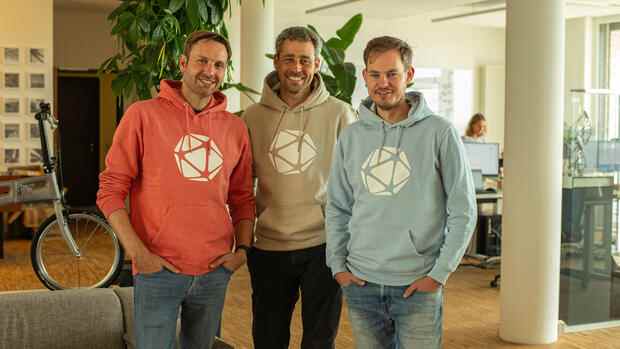Daniel Siegel, Moritz Maier, Sebastian Moeller (from left to right) want to shorten production processes in engineering. Your Elise software was designed for this.
Dusseldorf The Bremen start-up Elise has big plans: The founders want to collect the knowledge of engineers and automate parts of the product development. Above all, the time for drafting, designing and constructing should be shortened. Investors appreciate the project. The start-up is now collecting 14.5 million euros, as the Handelsblatt learned from investor circles.
The money comes from US investor Spark. Also on board are BMW’s venture capital subsidiary iVentures and the UVC fund. The financing is seen as a vote of confidence in uncertain times on the markets.
Moritz Maier, one of the three founders of Elise, says: “The world of product development is dusty. Little has changed for 30 years, there is too much back and forth, too many silos, too many software programs.”
Elise’s solution is called “Connected Engineering”. It bundles the entire wealth of experience of the engineers. The project is well received by well-known companies. The 35 customers include corporations such as Airbus, BMW, Lego and Miele.
Top jobs of the day
Find the best jobs now and
be notified by email.
Benjamin Erhart, a partner at UVC and one of the early investors, says: “Elise stood out. It wants to change the DNA of product development.” Engineering tools that run better and faster, but only improve partial aspects of the development process, “are offered to us all the time,” explains the investor.
Engineering knowledge in an algorithm
It often takes months for a product to reach production. First it is developed, designed, constructed and then tested. If there are supply chain problems or new customer requests, engineers redesign the product. They confer to solve the problems.
According to Elise, an engineer spends 40 percent of the time entering or moving data.
Elise wants to turn the process knowledge of engineers into an algorithm.
(Photo: Stone/Getty Images)
The problem is that the employees in the development stages work separately from each other. Whether in development, construction or purchasing – special software and tools are used everywhere, which come from providers such as Siemens, PTC or Dassault and cannot communicate with each other.
The Elise software aims to change that and turn the process knowledge of engineers into an algorithm. All the requirements for a component are then collected in the software and linked to sets of rules.
With so-called low-code elements, which do not require in-depth programming knowledge, any engineer can change parts of the program and create new designs and products with various parameters.
>> Read here: The world’s largest underground cooling system: How Singapore is fighting against overheating
This could apply to components for the Airbus A320, for example. They are developed by the Augsburg aircraft supplier Premium Aerosystem. A lot of time was saved with the help of the Elise software: Certain components were completed in five days instead of two months. Klaus Kalmer, chief engineer at Premium Aerotec, says: “This significantly reduces development costs.”
But as with any new technology, there are caveats. Some engineers are reluctant to give up their knowledge advantage. Not without reason. “Some are afraid of our software, it would automate their work away,” says Elise founder Maier. Typically, after a week or two, “click with the employees, then they see the potential and it spreads like wildfire in the company .”
Innovation for product development
Elise originates from a project of the Alfred Wegener Institute in Bremen. There, some employees have been researching lightweight construction and bionics since 2009, how they can reduce weight in production and generate innovation.
The Bremen start-up Elise bundles the wealth of experience of engineers.
(Photo: DigitalVision/Getty Images)
The team used numerous engineering tools such as CAD software or Excel spreadsheets. The four founders thought it should be faster and better and developed their own software. In 2018 they founded Elise.
The company’s valuation has increased significantly since then. “We are convinced that sooner or later the Elise platform will be the definitive tool for engineers in their day-to-day business,” says UVC partner Erhart.
Next year, the start-up wants to expand into the US – the largest market for software. Elise co-boss Maier says: “The mentality there is more like ours. Americans are more open to new technology, while German manufacturers are already struggling with the switch to the cloud.” There are fewer concerns, “but of course the software has to deliver what it promises”.
More: “There is now massive investment”: Why more and more companies are using robots
